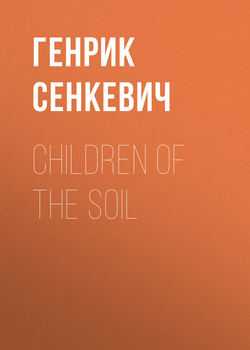Читать книгу Children of the Soil - Генрик Сенкевич, Henryk Sienkiewicz - Страница 18
CHAPTER XVI
ОглавлениеOn the following day Marynia offered to stay at Pani Emilia’s till Litka should recover perfectly. Litka supported this offer, which Pani Emilia, after a short opposition, was forced to accept. In fact, she was dropping down from weariness; the health of the sick girl demanded unceasing and exceptional watchfulness, for a new attack might come at any instant. It was difficult to calculate or be sure that a servant, even the most faithful, would not doze at the very moment in which speedy assistance might save the child’s life; hence the presence of Marynia was a real aid to the anxious mother, and calmed her.
As to Plavitski, he preferred to eat at the restaurant, and made no trouble. Marynia, moreover, went in every day to inquire about his health and bring domestic accounts into order; then she returned to Pani Emilia to sit half the night by the little girl.
In this way Pan Stanislav, who passed at Pani Emilia’s all the time free from occupation, and received, or rather dismissed with thanks, those who came to inquire for Litka’s health, saw Marynia daily. And she in truth amazed him; Pani Emilia herself did not show more anxiety for the child, and could not nurse her more carefully. In a week Marynia’s face had grown pale from watching and alarm; there were dark lines beneath her eyes; but her strength and energy seemed to grow hourly. There was in her also so much sweetness and kindness, something so calm and delicate in the services which she rendered Litka, that the child, despite the resentment which she cherished in her little soul, began to be kind to her; and when she went for some hours to her father, Litka looked for her with yearning.
Finally the little girl’s health seemed to improve in the last hours. The doctor permitted her to walk in the chamber and sit in an armchair, which on sunny days was pushed to the door opening on the balcony, so that she might look at the street and amuse herself with the movement of people and carriages.
At such times Pan Stanislav, Pani Emilia, and Marynia stood near her frequently; their conversation related to what was passing on the street. Sometimes Litka was wearied, and, as it were, thoughtful; at other times, however, her child nature got the upper hand, and everything amused her, – hence the October sun, which covered the roofs, the walls, and the panes of the shop windows with a pale gold; the dresses of the passers-by; the calling of the hucksters. It seemed that those strong elements of life, pulsating in the whirl of the city, entered the child and enlivened her. At times wonderful thoughts came to her head; and once, when before the balcony a heavy wagon was pushing past which carried lemon-trees in tubs, and these, though tied with chains, moved with the motion of the wagon, she said, —
“Their hearts do not palpitate.” And then, raising her eyes to Pan Stanislav, she asked, —
“Pan Stas, do trees live long?”
“Very long; some of them live a thousand years.”
“Oh, I would like to be a tree. And which does mamma like best?”
“The birch.”
“Then I would like to be a little birch; and mamma would be a big birch, and we should grow together. And would Pan Stas like to be a birch?”
“If I could grow somewhere not far from the little birch.”
Litka looked at him shaking her head somewhat sadly, said, —
“Oh, no! I know all now; I know near what birch Pan Stas would like to grow.”
Marynia was confused, and dropped her eyes on her work; Pan Stanislav began to stroke lightly with his palm the little blond head, and said, —
“My dear little kitten, my dear, my – my – ”
Litka was silent; from under her long eyelids flowed two tears, and rolled down her cheeks. After a while, however, she raised her sweet face, radiant with a smile, —
“I love mamma very much,” said she, “and I love Pan Stas, and I love Marynia.”
